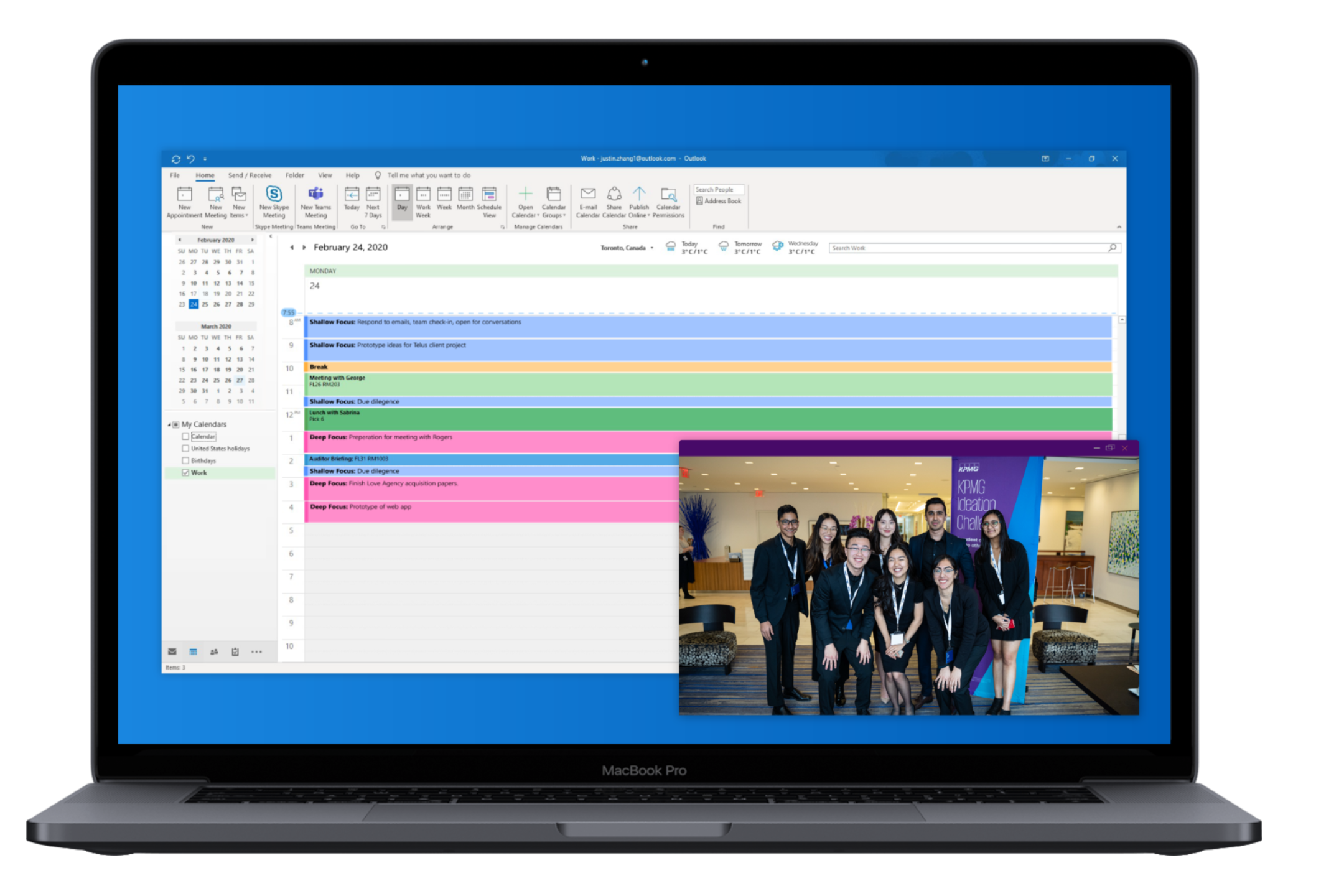Overview
This month-long ideation challenge was split into two different parts. I was invited to attend the Regional round in January where our team was able to move onto Nationals. Our solution consisted of a personalized productivity system to incorporate time-blocking as well as project management tools leveraging machine learning.
Roles
Product Manager, Technical Lead
Team
Angel Huang, Moksha Antani, Omar Kabir, Sarah Huynh, Palvisha Sharma
Tools
After Effects, Photoshop, PowerPoint
Type
Challenge
Timeline
January 2020 - February 2020
Part 1 - Regional Round
48 Hours
Problem Statement
How might you create a solution using advanced analytical technologies that enables your client to achieve more in less time?
With only 12 hours to create a product, develop a pitch, and deliver it in front of a panel of judges, we knew that we had to focus our collective efforts on the project at hand.
Our final idea settled on driving workplace efficiencies using the organizational concept of time blocking, leveraging analytics and machine learning to make the process simpler and more intuitive.
We distilled down the original problem statement to something that was more applicable for our solution: How might we decrease time mismanagement that is caused by thinking about and organizing what you have to do, and instead get you focused on actually doing those things?
Target Market
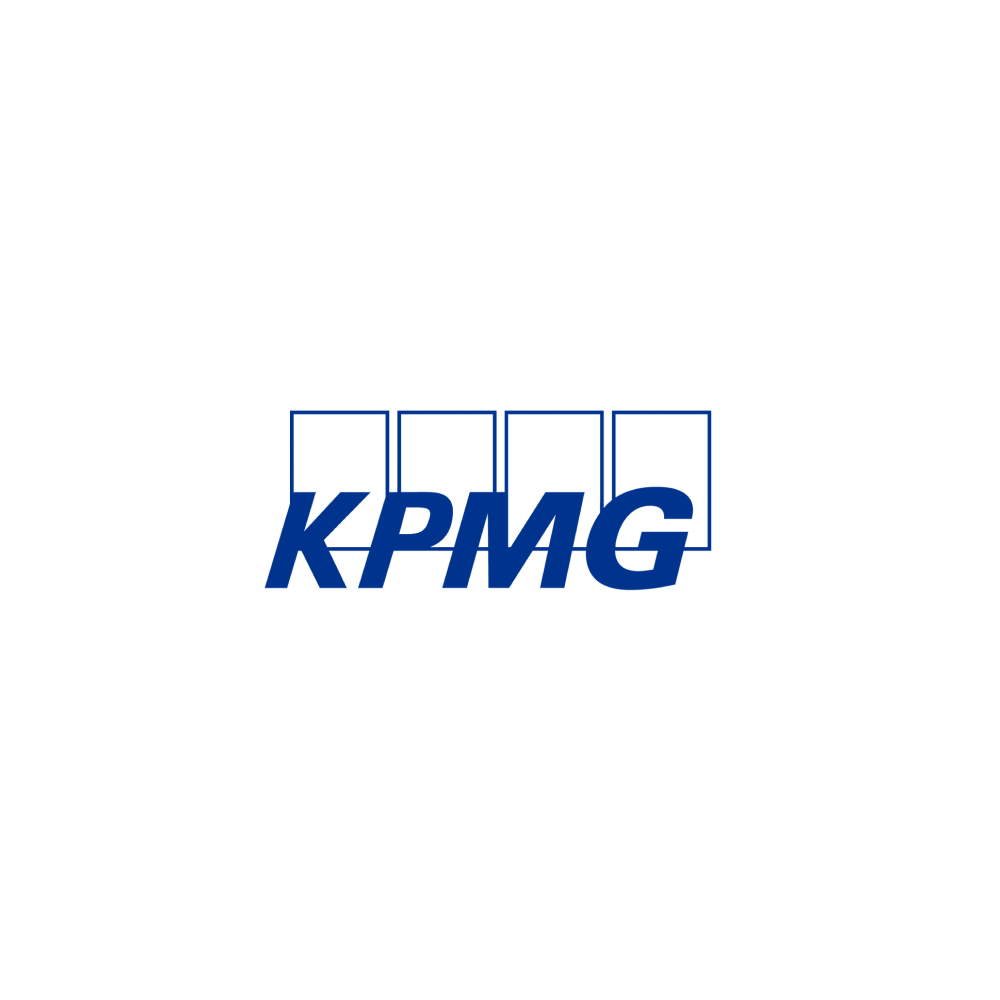
Professional Service Firms was the market that we chose. This was due to the fact that we had many employees available to us to refine the product, while also seeing how they all used a very standardized set of tools which could reduce any installation overhead.
Research Assumptions
Due to our time constraint, our research time was limited. We focused primarily on speaking to those around us, and getting their point of view.
With the always-on state of connected devices, employees are getting overwhelmed and don't know when to work on tasks
Needing to actively manage tasks and coordinate across busy schedules decreases over all productivity of employees
A study showed that individuals that were given a predetermined schedule performed better than those who multi-tasked or created their own schedules
SourceUser Persona
Due to our limited time, we decided to focus on one single user persona based on conversations that we had with multiple employees.
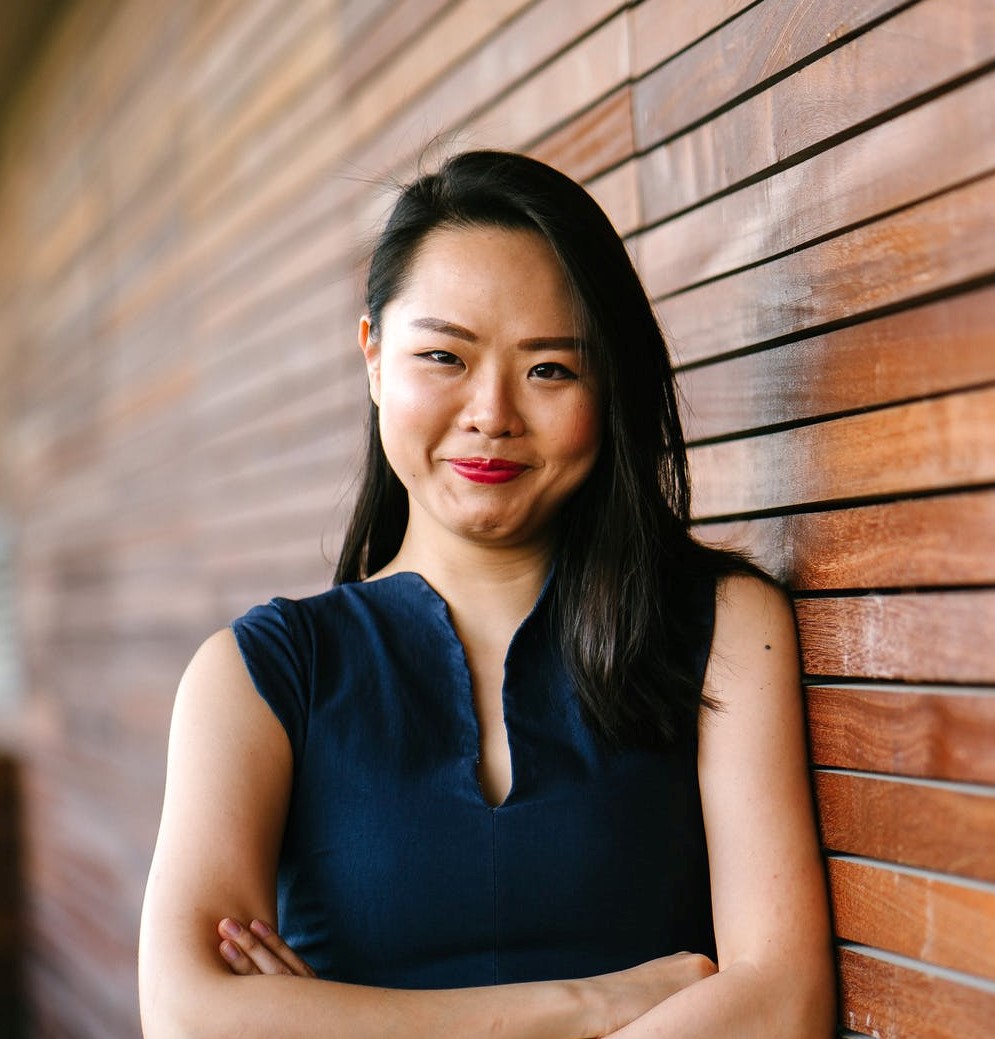
Jenny
Jenny is a 24 year old working within KPMG’s Management Consulting Practice. She organizes her daily schedule using MS Outlook, Trello, sticky notes, and sometimes a simple mental note to self. Jenny often feels disorganized and finds it burdensome to manually input her tasks and meetings into her calendar to stay on top of things. Not only does this take up valuable time that she could be using on other projects, it is distracting and pulls focus throughout her day. Scheduling meetings through coordinating other coworkers’ calendars is an even bigger pain point.
A team picture before pitching!
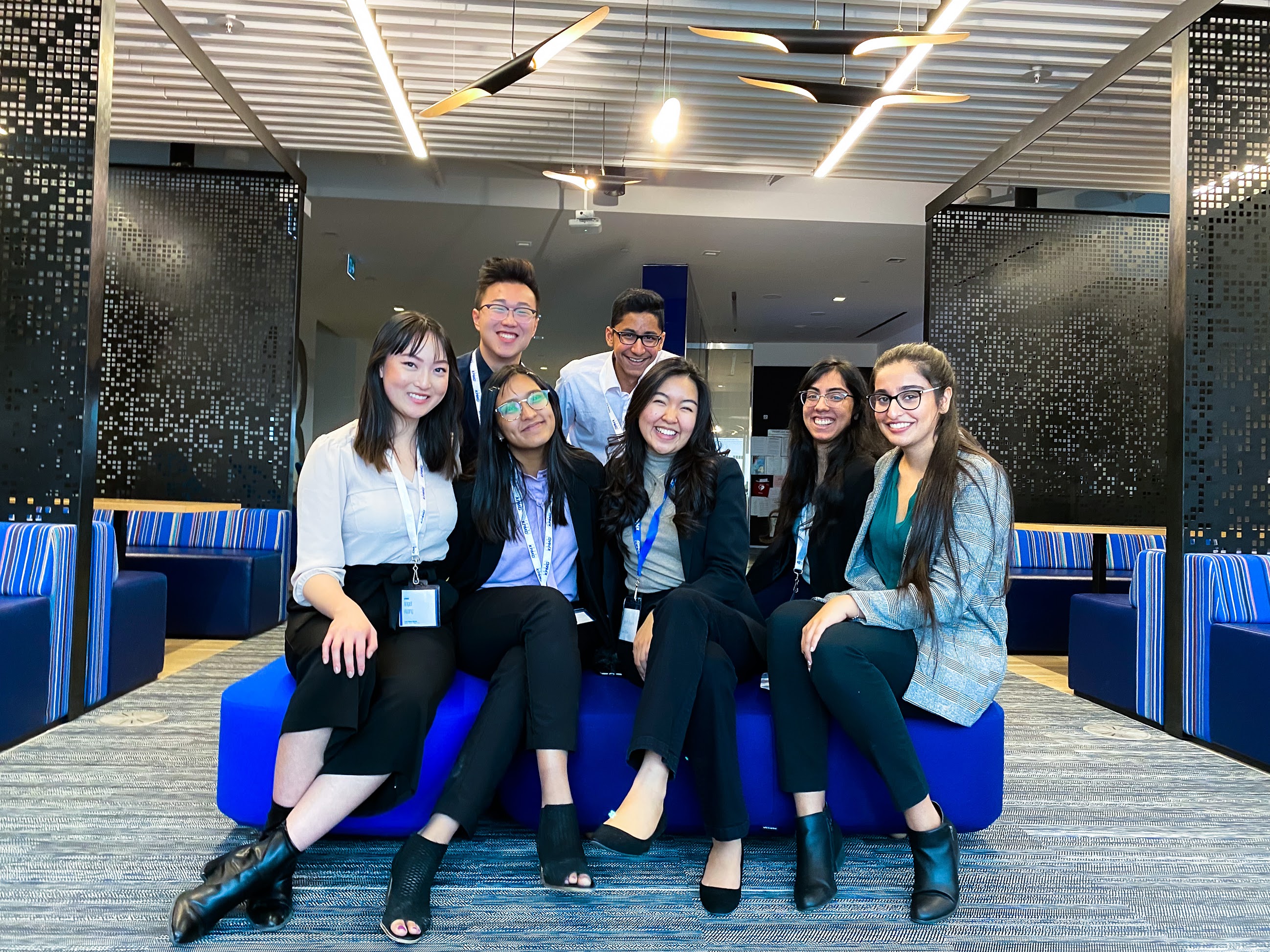
The Solution
An Outlook extension that would learn the user's work habits through Machine Learning, create tasks from emails using Natural Language Processing, and schedule in blocks of time to focus and complete the work.
The application would also see what kinds of to-do items already exist, and begin to guide the user towards starting work. This would reduce the need to plan out one's day, while also taking advantage of Deep Focus periods for maximum productivity.
Key Performance Indicators
With productivity in mind, our KPIs would revolve around user retention while also seeing how it would affect productivity through the completion of tasks.
- Keeping a high completion rate of scheduled tasks
- Daily active users scheduling tasks
- A decrease in time for completing similar tasks
Using this data, we can get an overall picture of how the tool is helping employees stay focused and identify problems that need solving.
Competitive Analysis
After comparing our proposed solution to many similar products (Toggle, Rescue Time, Calendly, Omnifocus, Cortana Scheduler), SmartCal stands out by focusing on personalizing the experience for every user based on their work habits, while also performing the repetitive task of creating calendar events automatically.
After The Pitch...
Our team won!
We were going to be representing Ontario in the National Round! This meant that we would have another month to refine and practice our pitch.
A team picture after pitching!
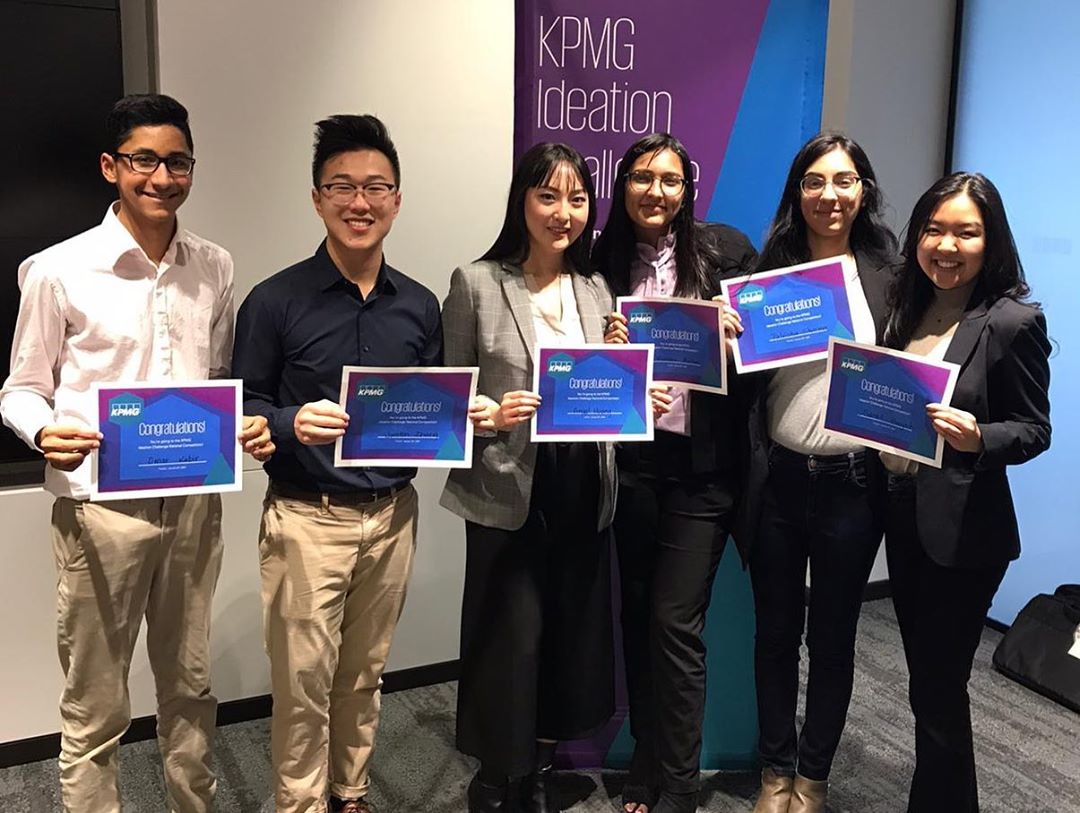
Part 2 - National Round
24 Hours
Watch The Video Recap!
Next Steps
After landing in Toronto, I would have 4 days to prepare with my team for our final pitch. This time, we would be up against 3 other teams representing British Columbia, Alberta, and Quebec.
With more time to prep, our next step was to project financial results while also producing development road-maps.
Financial Analysis
Using Microsoft Azure’s tools, we projected that the variable costs for running such a platform would be reasonable. Our pricing model would mimic popular SaaS companies and we would charge 6$/user/month. We felt like this would be a reasonable investment into employees as such a concept could derive a higher ROI due to productivity increases.
Furthermore, from a Customer Lifetime Value perspective, we assumed a 5-year career path for an employee at the staff/senior level to transition into a management role. This turned out to be $353.75 over the 5-year period.
Product Roadmap
With KPMG as a starting point, the product would begin in the initial development phase. Lasting around 4 weeks, it would consist of 2 sprints to build out an MVP with its core features.
Next, the program would be pushed out to a select team to begin gathering baseline information and usage habits to provide inputs for a Machine Learning model. The team chosen was an internal group which focuses on the professional development and training for future leaders. This would allow for better future adoption due to decision makers being already familiar with the software.
During the testing period, the development team would also be iterating on new features and fixing any issues that come up.
With the metrics and a relatively stable product, then we would begin marketing and outreach. Awareness campaigns would be started, and we hope to start onboarding more teams within the organization.
Finally, as more users begin implementing SmartCal into their routines, the tool becomes more useful as employees begin to understand when they are most productive and respect other’s focus periods. This would lead onto the product being pitched and expanding beyond KPMG Toronto.
During our final pitch, presenting our opening video

In the end...
We did not move on.
Although it was disappointing, I am still so grateful for being able to meet and work together with my team. Furthermore, having the opportunity to learn from professionals in the industry gave me a new perspective on the product development process.
A group photo with all the Canadian Finalists. Congratulations Team Alberta!
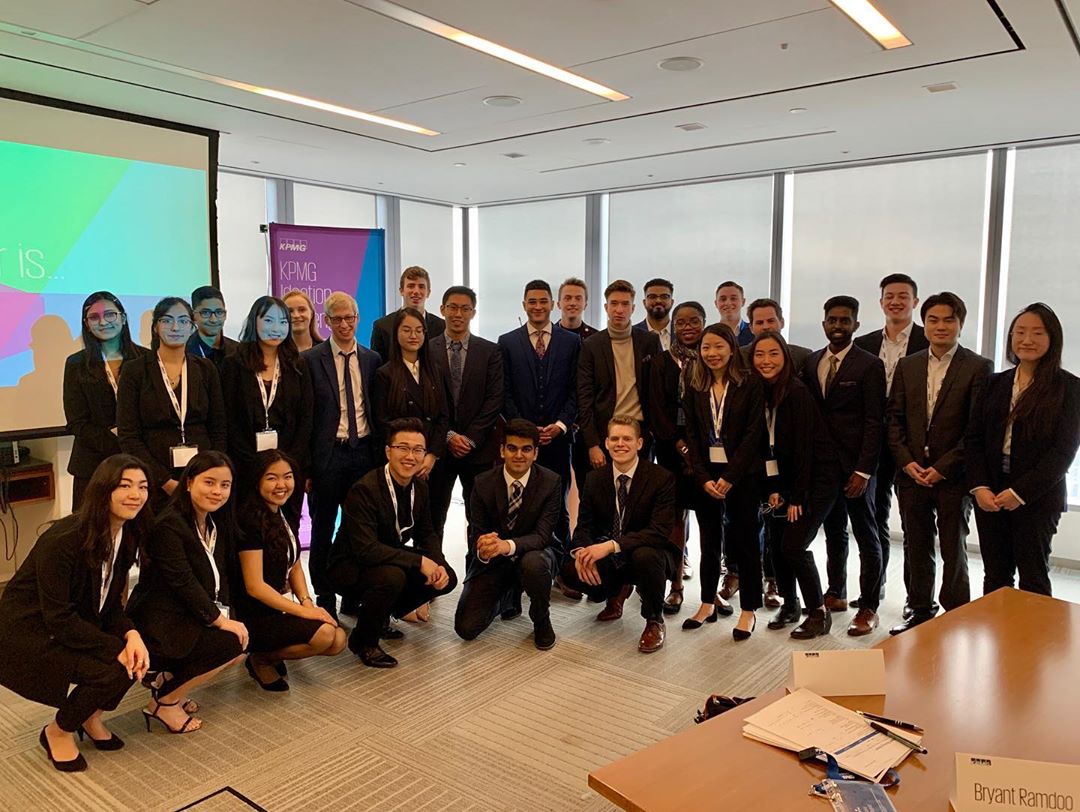
Conclusion
In all, I was given an incredible opportunity to put my product thinking to the test and work towards solving an actual business problem. This exposed me to the nitty gritty of distilling the problem down to its core and testing new hypotheses. Being able to grow my network within the firm, as well as with motivated students from across Canada also allowed me to meet and develop valuable relationships.
I also learned a lot in terms of how to properly create a pitch, and convince others of the value that you believe your idea to have. We had to work towards getting excited about our vision, as well as keeping our team motivated to contiously iterate on its production.
Looking Forward
With this experience, I'm looking forward to applying what I learned in future projects, as well as keeping in touch with the amazing individuals that I was able to meet!
Back Home